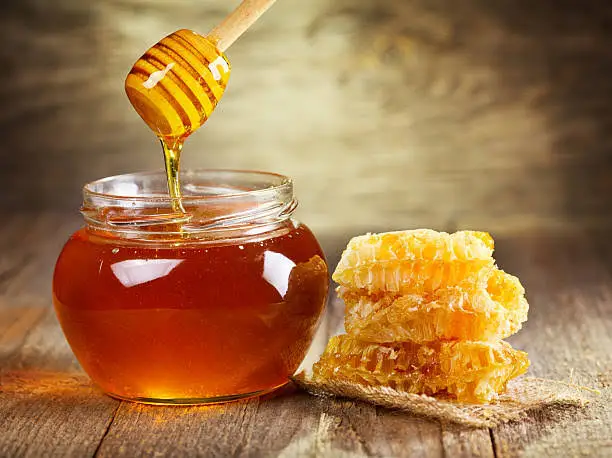Honey has been cherished by humans for thousands of years, not only for its delightful sweetness but also for its numerous health benefits and versatile uses. This golden nectar, produced by the hardworking honeybee, is more than just a natural sweetener—it’s a powerhouse of nutrition, a remedy for ailments, and a symbol of nature’s ingenuity. In this blog post, we’ll dive into the fascinating world of honey, exploring its history, benefits, and creative uses.

A Brief History of Honey
Honey’s story is as old as civilization itself. Archaeologists have found evidence of honey harvesting dating back to 8,000 years ago in ancient cave paintings. The Egyptians used honey as a sweetener, a gift to the gods, and even as an embalming fluid. In ancient Greece, it was revered for its medicinal properties, and in Ayurvedic medicine, honey has been used for centuries to balance the body and promote healing.
Honey’s longevity is remarkable—it never spoils! Archaeologists have discovered pots of honey in ancient Egyptian tombs that are over 3,000 years old and still perfectly edible. This is due to honey’s unique composition, which makes it resistant to bacteria and spoilage.
How Honey is Made
Honey is the result of a fascinating collaboration between bees and flowers. Worker bees collect nectar from flowers and store it in their honey stomachs. Enzymes in the bees’ stomachs break down the complex sugars in the nectar into simpler sugars. Once back at the hive, the bees deposit the nectar into honeycomb cells and fan it with their wings to evaporate excess water, thickening it into honey. The bees then seal the honeycomb with beeswax, preserving the honey for future use.
The flavor, color, and aroma of honey depend on the types of flowers the bees visit. For example, clover honey is light and mild, while buckwheat honey is dark and robust.
Health Benefits of Honey
Honey isn’t just a treat for your taste buds—it’s also packed with health benefits:
- Natural Energy Booster: Honey is a great source of carbohydrates, providing a quick energy boost. Its natural sugars are easily absorbed by the body, making it a popular choice for athletes.
- Soothes Sore Throats and Coughs: Honey has been used for centuries as a remedy for sore throats and coughs. Its thick consistency coats the throat, while its antibacterial properties help fight infections.
- Rich in Antioxidants: High-quality honey contains antioxidants like phenolic acids and flavonoids, which help protect the body from oxidative stress and inflammation.
- Wound Healing: Honey’s antibacterial and anti-inflammatory properties make it an effective treatment for minor burns, cuts, and wounds. Medical-grade honey, such as Manuka honey, is often used in clinical settings.
- Digestive Aid: Honey can promote gut health by acting as a prebiotic, feeding the beneficial bacteria in your digestive system.
Creative Uses for Honey
Beyond its role as a sweetener, honey can be used in a variety of creative ways:
- Skincare: Honey is a natural humectant, meaning it draws moisture into the skin. Use it as a face mask to hydrate and soothe your skin.
- Hair Care: Mix honey with olive oil for a nourishing hair mask that adds shine and softness.
- Cooking and Baking: Honey adds depth and complexity to dishes. Use it in marinades, salad dressings, or as a glaze for roasted vegetables.
- Preserving Food: Thanks to its antimicrobial properties, honey can be used to preserve fruits and other foods.
- DIY Home Remedies: Combine honey with lemon and ginger for a soothing tea, or mix it with cinnamon for a natural immune booster.
Choosing the Right Honey
Not all honey is created equal. To reap the full benefits, opt for raw, unprocessed honey. Unlike commercial honey, which is often pasteurized and filtered, raw honey retains its natural enzymes, antioxidants, and nutrients. Look for local honey, as it may help with seasonal allergies by exposing your immune system to small amounts of local pollen.
A Word on Sustainability
As we enjoy the benefits of honey, it’s important to remember the vital role bees play in our ecosystem. Bees are essential pollinators, responsible for one-third of the food we eat. Unfortunately, bee populations are declining due to habitat loss, pesticides, and climate change. Supporting local beekeepers, planting bee-friendly flowers, and avoiding harmful pesticides are small steps we can take to protect these incredible creatures.
Conclusion
Honey is truly a gift from nature—a sweet, golden elixir that nourishes, heals, and delights. Whether you’re drizzling it over your morning toast, using it to soothe a cough, or incorporating it into your skincare routine, honey’s versatility and benefits are unmatched. So the next time you enjoy a spoonful of honey, take a moment to appreciate the incredible journey it took from flower to hive to table.
What’s your favorite way to use honey? Share your thoughts and recipes in the comments below!
Disclaimer: While honey offers many health benefits, it should not be given to children under one year of age due to the risk of botulism.